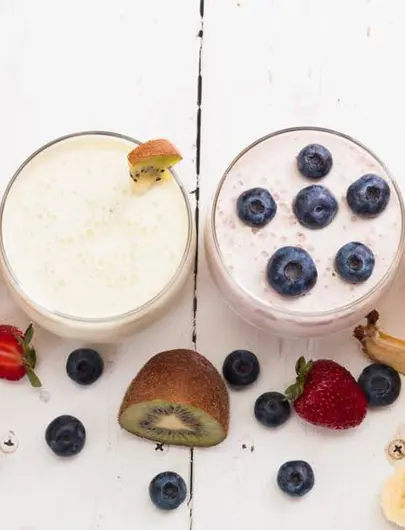WPI, WPC, or pea or brown rice or soy protein? Yep, the protein powder aisle can be confusing, and what’s right for one person isn’t necessarily good for the next. Here are my answers to your questions on all things protein powder.
“What does WPI and WPC stand for, and what’s the difference between the two?”
WPI = Whey Protein Isolate.
WPC = Whey Protein Concentrate.
Whey protein is the purer variety, having a higher protein content and minimal fat and carbohydrate content; WPC has a higher fat and carb content than WPI and is cheaper to produce – the reason why you often see it in mass produced protein powders and protein bars. WPC also tends to be added to meal replacement protein powders alongside WPI, as these require a controlled amount of carbohydrate.
“What exactly is whey?”
Whey is a liquid byproduct of milk once it’s been curdled, for instance in cheese production. For the sake of protein powder, the whey is dried, but yields a smooth, creamy taste and consistency once blended in a shake.
“Can I have whey-based protein powder if I’m lactose intolerant?”
Because lactose is a carbohydrate, WPI – containing a negligible amount of carbohydrate - will have a low lactose content and so should be suitable if you’re lactose intolerant. I’d steer clear of WPC though, as its higher carb content indicates more lactose and a potential tummy upset.
Also worth noting is that some people find they’re sensitive to components in milk other than lactose, in which case a plant-based protein powder may be more suitable.
“I’m looking for a plant-based protein powder. What do you recommend?”
I’m a fan of pea or brown rice protein powder, or better yet a combination of the two, like in Bulk Nutrients’ Earth Protein, a natural rice and pea protein powder. Some people find plain pea protein too gritty, but when combined with smoother brown rice protein the grit-factor is gone and you get a nice nutty flavour. Plus, when you combine plant based proteins, you get a greater variety of amino acids (the building blocks of protein), each of which have their own unique role in the body; You also get a higher concentration of the varying amino acids, allowing for greater muscle grown, recovery and repair.
“What else do you look for in a clean, quality protein powder?”
Whether you’re going for a whey or plant-based protein powder, one that’s good for you will be:
- Free from genetically modified (GM) ingredients – One of the reasons I don’t go for soy-based protein powder, as it tends to be GM. If a soy protein powder doesn’t state their soy as being GM-free on the ingredients list, you may want to put it back on the shelf.
- Sugar Free – A large reason why so many of us are hopping on the protein powder train is to shift a few extra kg, as adequate protein helps stabilise blood sugar and so can curb your appetite. So, a whole heap of sugar (AKA evaporated cane juice) in your protein powder (or protein bar) kind of defeats its purpose.
Look for varieties naturally flavoured with cacao/cocoa or vanilla powder instead, and sweetened with sugar free, plant-based sweeteners such as stevia or thaumatin, as these wont raise your blood sugar. Or, pick a plain variety and flavour and sweeten it yourself with cinnamon and a little stevia. - Without Artificial Sweeteners – Yes artificial sweeteners are sugar free and have less of an impact on your blood sugar, but a protein powder with a coded sweetener indicates a highly processed, unnatural food product. And because we’re not designed to digest artificial sweeteners (because after all, they aren’t really a food), an artificially sweetened protein powder may result in digestive upset, with symptoms like bloating, a bellyache, gas and diarrhoea. As a rule of thumb, any unfamiliar ingredient that ends in ‘ol’ (e.g. mannitol, sorbitol) is one to avoid.
- One with a Short Ingredients List – A long list of unfamiliar and coded ingredients is a red flag for an overly processed product, full of artificial colours, flavours and thickeners. Really all a high quality protein powder should have is whey/brown rice/pea protein, some cocoa/vanilla and a plant-based sugar free sweetener like stevia. Nutritious and delicious.
To find out more about Bulk Nutrients Earth Protein which is dairy free, low allergan, soy free, GMO free and made with 100% organic brown rice visit www.bulknutrients.com.au

